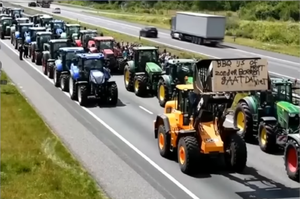2022 Dutch farmer protest
 | |
| Date | 2022 |
|---|---|
| Location | Netherlands |
| Description | During summer of 2022, tens of thousands of farmers have gathered from all across the Netherlands to protest government policies which will reduce the number of livestock -and farmers - by up to a third, as part of The Great Reset. |
During summer of 2022, tens of thousands of farmers have gathered from all across the Netherlands to protest government policies which will reduce the number of livestock -and farmers - in the country by up to a third. Despite being barely covered in corporate media, the protests have received public support and have inspired similar protests elsewhere.[1]
Contents
Official narrative
What protests?
Corporate media is presumably still waiting for a mystery masked single guy with a swastika flag before they will cover it more extensively.
In one story in Algemeen Dagblad covering blocking of highways by "hundreds of angry farmers", the angle chosen was: "a surgeon at St. Antonius Hospital who watched the farmers' protest from a viaduct, was furious. According to him, colleagues could not pass the procession. 'People are dying because of this.'"[2] No proof of this was provided.
Background
Netherlands is Europe's biggest meat exporter, with the highest density of livestock in Europe – more than four times that of the UK or France – with more than 100 million cattle, chickens and pigs in total. The government policy being protested is a 25 billion Euro investment in “reducing levels of nitrogen and ammonia pollution” generated by livestock by 50% come 2030, by paying some Dutch livestock farmers to "voluntarily" relocate or exit the industry.[1] The government is also looking at mandatory purchases of farms that would lead to closures.
In real terms, this ultimately means reducing the number of pigs, chickens and cows by about thirty per cent[3], and also force 30% of the country’s farms out of business, according to a Dutch farmers’ union[1]. This deliberate shrinking of the farming sector will impact the livelihood of thousands of farmers, and the food supply of hundreds of millions of people.
Minister Henk Staghouwer of the Ministry of Agriculture, Nature and Food Quality wants to subject the smaller Dutch fishing boats to new nitrogen regulations. They may not receive a fishing license from 2023 if they cannot prove that their nitrogen emissions would not cause any damage. Many fishing companies are now on the brink of collapse.[4]
The Great Reset
The Netherlands is host of the Global Co-ordination Secretariat (“GCS”) for the worldwide network of Food Innovation Hubs. Dutch Prime Minister Mark Rutte said on 26 January "It was great to have support for the initiative by Foodvalley members Mengniu Dairy, DSM and Unilever this week at the online WEF Davos panel session on the transformation of food systems". [5]
Eric Wiebes, Dutch Minister of Economic Affairs and Climate Policy, signed a letter of intent with the WEF 8 December 2020. Amongst other things, the letter of intent states: “The Dutch innovation and agricultural policy are very much in line with the topics that are considered crucial by WEF for Food System Transformation … missions have been defined in line with the SDG addressing topics like of sustainability circular agriculture, safe, healthy and affordable food for all climate neutrality as well as consumer behaviour. There is special attention to development and implementation of key enabling technologies e.g., Digitalisation, Artificial Intelligence, Internet of Things, biotechnology and micro and nanotechnology in the Agri-Food sector.”[5][6]
Protests
Farmer protests have been ongoing since 2019. On 10 June 2022 the protests became more prominent after the new government plans were announced.
On 4 July, farmers began blocking roads with parked vehicles to shut down logistical chains for food distribution, including denying access to supermarkets.[7][8] By 5 July, police were deployed in more and more places to end protests. A blockade of some distribution centers of supermarkets was lifted when the riot police arrived on the scene. The farmers eventually left of their own accord. Police started fining people, mostly for driving tractors on the highway.[9]
Protests other places
German farmers joined the Dutch protesters in blocking the road on their shared border.
References
- ↑ a b c https://thedeepdive.ca/farm-to-road-wave-of-farmer-protests-spreads-across-europe/
- ↑ https://www.ad.nl/woerden/boze-boeren-met-tractor-op-a12-politie-grijpt-niet-in-mogelijk-krijgen-ze-achteraf-een-boete~a3532c07/?referrer=https%3A%2F%2Findepen.nl%2F
- ↑ https://www.theguardian.com/environment/2021/dec/15/netherlands-announces-25bn-plan-to-radically-reduce-livestock-numbers
- ↑ https://deanderekrant.nl/nieuws/visserij-op-omvallen-vissers-voegen-zich-bij-boerenprotest-2022-06-24
- ↑ a b https://expose-news.com/2022/07/10/documents-dutch-gov-wef-great-reset/?cmid=b0d84d30-75ee-4932-87c0-07e1dbad9da9
- ↑ https://www.tweedekamer.nl/kamerstukken/kamervragen/detail?id=2021D50828&did=2021D50828
- ↑ https://web.archive.org/web/20220706170559/https://www.politico.eu/article/police-fire-dutch-farmer-protest-nitrogen-emission-cut/
- ↑ https://www.express.co.uk/news/world/1635441/dutch-farmers-block-supermarket-warehouses-roads-emissions-protest-update
- ↑ https://www.blckbx.tv/binnenland/boerenprotesten-gaan-door-politie-treedt-steeds-vaker-op
